Yorktown
Mac moved up the Peninsula towards Richmond and was promised McDowell’s men if D.C was free of threat. His army’s first encounter was with Confederate General John Magruder and a small Confederate force at Yorktown. Magruder skillfully deceived Mac into believing his force was larger than it actually was. He accomplished this by repositioning the same troops in various locations, acting aggressively, continuously moving small units, using ammunition freely, and setting up dummy defensive positions. This convinced Mac that the Confederate force was more significant than it truly was, prompting him to settle in for a siege while he awaited the arrival of his heavy artillery. Mac was concerned that his inexperienced troops might fail in an assault during the first battle of the campaign, which could damage their morale. Mac eventually captured Yorktown and 80 heavy guns without losses, but the delay gave the Confederates time to organize troops to defend Richmond.
Advance on Richmond
Mac then started to push toward Richmond, and the Confederates gave way. The Union army captured both supply and ordnance during this advance. Mac is criticized for slow movement with a smaller Confederate force in front of him, yet he relied upon his friend and “expert” spy Alan Pinkerton, founder of the Pinkerton Detective Agency. Whatever the value of Pinkerton’s other information, one area in which he failed was in accurately assessing enemy troop numbers. He gave Confederate force numbers from various agents as 160,000, 123,000, 180,000, and even 200,000 in Richmond. And on August 6, Federal General Halleck gave estimates of 200,000 around Richmond. Some Northern newspapers working independently gave even higher estimates than Mac did. Because of this, Mac actually believed he was outnumbered.
This was common during the War, with generals thinking the force opposing them was more extensive than it really was. Since this was his information, he believed he was not being cautious but aggressive and daring to continue the campaign, even if at a slow/careful pace. At the time, the enemy numbers were not certain. Mac also waited for his heavy siege artillery to come up from the back, as it was needed to attack Richmond’s prominent forts at the Confederate capital.
But without a doubt, the advance was working. Richmond was preparing to evacuate. It forced the Confederates to scuttle the ironclad Virginia, which caused a loss of morale throughout the Confederacy. Confederate General Joe Johnston called General Ewell from Jackson to help in Richmond. McDowell was advancing unopposed north of Richmond. Mac had achieved better success than McDowell, Burnside, Hooker, or Meade advancing on Richmond.
“It was not until 1864 that another Union army, led by Grant, would get as close to Richmond as McClellan did in the spring of 1862.”
David G. Martin, Great Campaigns: The Peninsula Campaign
The next time the Federals would get this close was under their top general, U.S. Grant. They also fought against a weakened Southern army in ‘64 with a much larger Federal army.
But this time, three things saved Richmond and stopped Mac from capturing the Confederate capital and being hailed as a hero. All three had to happen to stop Mac; two of them were very unlikely and could not have been foreseen.
1] Jackson in the Valley
“The most significant contrast between the Virginia campaigns of Grant and McClellan is that Early’s offensive did not accomplish its ultimate objective – to relieve the pressure on Lee’s army at Petersburg, Jackson’s campaign in the Shenandoah Valley did. Unlike McClellan before him, Grant would not be forced to alter his designs on the James River one iota.“
Thomas Rowland, George B. McClellan and Civil War History
Unlike Lincoln, Mac saw Jackson’s Valley campaign as a diversion by Lee (now in command of the Southern army) to pull Federals away to help protect Richmond. Richmond was saved because of Jackson’s brilliance in the Valley. He outmaneuvered and outfought a force over three times the size of his own (17,000- 60,000), defeating them in multiple battles while also threatening D.C.
Jackson knew Lincoln was concerned with protecting D.C. Hence, he knew that aggressive maneuvers would pull men from the Peninsula and help save Richmond. Jackson kept 71,000 additional men away from the Richmond attack with his victories and aggressive maneuvering. Lincoln was constantly scared by what Jackson might do, and this prevented McDowell and other troops from helping Mac; the withholding of McDowell would prove decisive.
2] Lincoln Recalling Troops to the Valley
“[It was] Jackson’s campaign, and the insane terror it inspired in Washington, which was the true cause of the failure on the peninsula.”
Colonel Ferdinand Lecomte, quoted in George Stillman Hillard’s Life and Campaigns of George B. McClellan
Because of Jackson, Lincoln recalled troops to defend Washington and the Valley. He also held back McDowell’s 40,000 from the attack on Richmond. This “Changed the whole nature of the confrontation near Richmond,” and “The Confederacy was truly handed an amazing gift.” Mac would have rather left Jackson to clear out the Valley and even attack D.C. if he wished. Mac had built massive forts with a large garrison to protect the capital.
“Here is the true defense of Washington, it is here on the banks of the James.”
McClellan to Halleck August 4th, quoted in George Stillman Hillard’s Life and Campaigns of George B. McClellan
After Pinkerton reported a large number of enemy forces to McClellan, he paused his attack due to McDowell’s absence. McDowell was supposed to launch an assault on Richmond from the north to prevent the Confederates from mounting counterattacks. McDowell described his recall to the valley as “a crushing blow to us.” Even Lincoln told McClellan, “If you believe you are not strong enough to take Richmond, just know that I do not ask you to try. Just know.”
3] Lee Replaces Joe Johnston
General Joe Johnston, the commanding Confederate general, was injured and replaced by Robert E. Lee. This would change the entire campaign. Mac had been slowly pushing Johnston back towards Richmond, but Lee would take the initiative and attack Mac.
Lee vs Mac
Lincoln’s maneuvers significantly reduced Mac’s forces near Richmond attempting to trap Jackson in the Valley. Heavy rains swelled the Chickahominy River and created a split in the Potomac army, and Lee saw his opportunity.
Lee, whom many consider not only the premier general of the South but of the entire War, recalled Jackson from the Valley to help in the offensive vs. Mac, now with a force nearly equal to his.
Lee would strike the smaller portion of Mac’s army and threaten its supply line under General Porter. Porter was supposed to be supported by McDowell from the north to meet up with his flank coming south from Manassas. Had Mac’s plan been allowed, the attack would not have been possible. However, when Lincoln sent McDowell to the Valley to trap Jackson, Porter was vulnerable, and Lee pounced, enabling its strategic success.
“General McClellan wished and had advised that reinforcements should be sent him by water, as their arrival would be more certain. Now that the James River was open, they might have been sent by that route… Richmond could have been approached by the James, and we should have escaped the delays and losses incurred by the bridging of the Chickahominy, and should have had the army massed in one body instead of necessarily being divided by that stream… the capture of Richmond could not be carried out because to the president’s distempered fancy Washington was not safe… McClellan was commanded to extend his right wing to the north of Richmond, in order to establish the communication between himself and General McDowell. This was running a great risk in case General McDowell should not come, because it exposed our right in a way no prudent officer would have done; and, as General McDowell did not come, the enemy did not fail to take advantage.”
George Stillman Hillard, Life and Campaigns of George B. McClellan
Lee attacked in multiple bloody battles, resulting in high losses on both sides. Mac would cause high casualties to Lee during the campaign, inflicting more losses than he received. However, Mac, going from “expert” information, believed he was outnumbered and was in danger of being cut off without help from the North. With Lincoln recalling so many of his troops, he ordered a retreat off the Peninsula. Mac telegraphed D.C., stating, “If I save this army now, I tell you plainly I owe no thanks to you or to any other persons in Washington… you have done your best to sacrifice this army.”
The retreat on the Peninsula was dangerous, yet McClellan and Porter skillfully conducted it to save their forces from disaster. Mac would withdraw by night and defend a favorable position by day. It was a major strategic victory for the South yet a tactical victory for the Union. Lincoln called it a “half defeat.” Given the force size and causalities suffered, Mac performed better than the future Union commanders of the Army of the Potomac.
-Peninsula campaign stats
-Union Forces 105,000, Casualties 23,900 approx.
-Confederate Forces (inc. Jackson) 88,500, Casualties 29,600 app.
Antietam/Mac Takes Command
“I must have McClellan to reorganize this army and bring it out of chaos… there is no man in this army who can man these fortifications and lick these troops into shape half as well as he can.”
Abraham Lincoln
“General McClellan has again assumed the supreme command of the army… His reception by the officers and soldiers was marked by the most unbounded enthusiasm. In every camp his arrival was greeted by hearty and prolonged cheering… Already his… visit to our camps has wrought a remarkable change in the soldiers. His presence seemed to act magically upon them; despondency is replaced by confidence, and all are glad that McClellan will, hereafter direct them.”
Ellis’s Leaves from the Diary of an Army Surgeon, p. 214, quoted in George Stillman Hillard’s Life and Campaigns of George B. McClellan
Lincoln’s selection of the aggressive Republican General John Pope to lead the army led to the embarrassment at Second Manassas. Pope was then exiled to Minnesota to fight Indians, and Lee turned his attention to an invasion of the North. Meanwhile, Mac had to reorganize Pope’s defeated, demoralized army that was integrated into his command and try to restore morale. Mac was reinstated in command of Pope’s army and the Army of the Potomac on September 2nd. The effect was immediate:
“The effect of the news was instantaneous. All of a sudden the federals forgot their defeat, weariness, and hunger and exploded into triumphant hurrahs, multitudes of caps were thrown in the air.”
John Cannan, The Antietam Campaign
Slow to Meet Lee?
A common criticism of McClellan during the Antietam campaign is that he was slow to move the army out to confront Lee’s invasion, which allowed Lee to enter Maryland. Lee entered Maryland around September 4-7. Mac had just taken control of a disorganized, defeated army on the 2nd, and “worked a minor miracle in the next few days as he restored the army’s morale and organization, and equally significant, its pride and sense of purpose.” No other man in the army could have restored morale and cohesion as quickly as Mac did before the Battle of Antietam. He had reorganized his army and marched to meet Lee by September 9th. Lee had expected a longer time for Mac to prepare, and his fast reaction spoiled Lee’s plan to capture Harrisburg, Pennsylvania. In his article “Showdown on South Mountain,” historian Dennis Frye wrote, “Pennsylvania was Robert E Lee’s target in September 1862. But Maryland and George McClellan got in the way.”
Mac had other reasons to be cautious. General Halleck advised General McClellan to be watchful regarding Washington, D.C., and to wait until General Lee’s intentions were fully understood. Halleck believed that Lee was attempting to draw McClellan out, rather than planning a direct attack on D.C. Additionally, McClellan received continual reports from his cavalry regarding enemy troop strength, estimating between 60,000 and 120,000 soldiers. General Porter estimated Lee’s army to be 100,000, while General Sumner’s assessment was 130,000. This information was accepted by the Union high command, who believed that Lee must have been reinforced in preparation for an invasion.
Mac moved west, forcing Lee to fall back to link with Jackson from Harpers Ferry. Mac helped lead the attack at the Crampton’s Gap, Turner’s Gap and Fox’s Gap battles—all victories. At Turner’s Gap, Confederate losses were 2,300 and Union losses 1,800, even though the attack was up a mountain and through rough terrain. On Sep 16th, Mac trapped Lee by a flank maneuver on Lee’s left and captured the road to Hagerstown, forcing Lee’s northern invasion to end. Frye wrote, “Lee saw his invasion crumbling. The most important matter now was not Pennsylvania, but preservation of the army.” Mac even took the unpredictable and aggressive General Stonewall Jackson off-guard, causing him to say, “I thought I knew McClellan, but this movement puzzles me.”
The Battle of Antietam
The two armies met near Sharpsburg, Maryland, on September 17th. The “cautious” Mac would assault the Confederate lines, leading to the bloodiest day of the war. Mac’s plan was to attack both the Confederate left and right simultaneously, followed up with a massive reserve attack in the center.
While not a complete failure the attack failed to destroy Lee, partly due to Burnside’s late arrival at the battle. Burnside delayed his assault on the Confederate right, “throwing off the whole plan,” and allowing Lee to shift reinforcements along his line to meet Union forces in the center and left. McClellan sent a half dozen couriers to Burnside to push him to strike more swiftly and threatened to relieve him of command. Yet, Lee’s army was nearly breaking in all three sectors.
Mac did not show tactical genius and made some mistakes, but in the end, it was a strategic victory for the North and a tactical draw. He rested on the 18th to resupply (artillery near out of ammo) and gave orders to attack come daylight on the 19th, but the Confederates had left. The battle sent Lee’s wounded army back to Virginia and, more importantly, ended any hopes the Confederacy had for European involvement in the war. Thus, Frye wrote that “George McClellan saved the union.”
“A man who could take a demoralized army, as McClellan took the combined forces that had been defeated under Pope in front of Washington at the second Bull Run, restore its discipline by the magic of his name and his swift reconstruction of its shattered organizations, and then lead it to victory within fourteen days, after an almost unexampled celerity of movement against the enemy who had crushed it two weeks before–such a man is not to be spoken of or thought of as wanting in the force and vigor of a great general.”
George T. Curtis, U.S. Commissioner, historian
Antietam stats:
Union Forces 87,000, Casualties 12,401
Confederate Forces 47,000, Casualties 10,316
McClellan Allowed Lee to Escape?
Lincoln heavily criticized Mac for not destroying Lee’s army and not following him back into Virginia. However, Mac had sent Porter to harass the enemy retreat, which had initial success, capturing 40 Confederate artillery pieces. However, A.P. Hill counter-attacked, pushing the Union men back across the Potomac. Hill said it was “The most terrible slaughter…a lesson to the enemy, and taught them to know it may sometimes be dangerous to press a retreating army.”
Often, retreating armies fought significant rearguard actions to prevent their own destruction. Civil War battles rarely ended with the destruction of one or other army, only in 1865 when the South was near defeat was an army nearly annihilated. The assumption it could happen in 1862 points more to the expectations of the early-war North than realistic military goals. When the army was criticized for not destroying Lee’s forces, a soldier in the Army of the Potomac replied. “Think the rebel army can be bagged? Let them come and bag them. Easy to talk about.” Historian John Cannan said the counterattack showed the Federals that the rebels “still had a formidable bite.” Dennis Frye, who studied the Antietam campaign for over 50 years, wrote that ideas that Lee could be easily destroyed were “Myths created by politicians” not accurate judgments based on historical truth.
Further, the Federals were low on supply and had just fought two large-scale engagements. Lee knew where Mac would be unable to supply his army and planned his withdrawal accordingly. Mac was also working off his cavalry’s and Pinkerton’s estimates of the Confederate strength. Thinking the Confederates still had equal force, he chose not to push the attack or risk a loss on Maryland soil that would endanger D.C. and the outcome of the war.
Far from defeated, after Lee had fallen back to Virginia he planned to continue the attack again. He sent Stuart’s Cavalry to create a bridgehead at Williamsport, Maryland, to renew the invasion. However, Mac had anticipated this move and sent his own cavalry along with the 6th Corps to prevent such a move. As argued by Dennis Frye, Mac outthought Lee in Maryland.
Later in October, Mac’s quick and aggressive move into the Warrenton, Virginia area surprised Lee, splitting Lee’s army. Both Lee and Longstreet were concerned. However, Lincoln had given the order two days before, and Mac was removed from command.
Conclusions
“There are strong grounds for believing that he was the best commander the army of the Potomac ever had.”
Francis Palfrey, Antietam, Fredericksburg
While I would not go as far as the above quote does, I would say Mac was the most underrated general of the war. He does not get credit where he should and gets the blame where he should not. I do not see Mac as cautious to a fault as claimed. It was often Lincoln, Stanton, and Halleck being over-cautious about protecting D.C. that interfered with Mac’s plans. And his military intel let him down, not his over-cautious nature.
“Look at his campaign in Western Virginia in 1861,–a part of his military career conveniently ignored by his enemies. Here he had a separate command, a defined field of action and was not hampered and trammeled by interference from Washington; and do we see any signs of indecision and want of promptness here? On the contrary, we observe the happiest combination of judgement in design and vigor in execution: one skillful and powerful blow was instantly followed by another, and the result was absolute and permanent military success.”
George Stillman Hillard, Life and Campaigns of George B. McClellan
Lincoln and the press wanted aggression, and the results were First Manassas, Burnside at Fredericksburg, Pope at Second Manassas, and later Hooker at Chancellorsville. No general of the early war could handle the tandem of Jackson and Lee. Extreme events withheld Mac from the capture of Richmond in ‘62.
A fair critical comparison between Mac and Sherman/Grant is favorable to Mac. Later, when Grant/Sherman gained victories, it was more because of the Confederate armies’ reduced capability to offer resistance than their ability to be outgeneral Mac.
I believe the real reason for Lincoln’s disappointment with Mac was the North’s high expectations. Underestimating the resolve of the South and their leadership, the North desired one battle and one victory in Virginia, which would win the war for them. But it took years for them to realize their error, though doubt began early as Lincoln wrote to his friend Carl Schurz in 1862, “I fear we shall at last find out that the difficulty is in our cause rather than in particular generals.”
“McClellan’s relationship with Lincoln is central to any understanding of why historians judge him as a flawed personality…Lincoln has attained a stature that sets him apart from other mortals”
Thomas J. Rowland, George B. McClellan and Civil Har History: In the Shadow of Grant and Sherman
Historians may have viewed McClellan negatively because he opposed and disagreed with Lincoln. He committed the “unpardonable sin” of running against Lincoln in the 1864 election on a peace platform aimed at ending the bloodshed. In 1864 George Stillman Hillard wrote, “The real reasons for which General McClellan was removed were political, and not military.” Historian Dennis Frye said “The Republicans could not allow McClellan to be a victor. They could not allow that to happen. They needed to do everything they could to smear McClellan.”
“However patriotic the abolitionist radicals in the north may have been, the very last thing they wanted was for Little Mac to win in the battle for Richmond….the abolitionists would lose their influence.”
S.C. Gwynne, Rebel Yell The Violence, Passion, and Redemption of Stonewall Jackson
“There is a political element connected with this war which must not be overlooked.”
Congressional Committee on the Conduct of the War Dec 26, 1861, quoted in George Stillman Hillard’s Life and Campaigns of George B. McClellan
Lincoln acknowledged that he made many errors that undermined McClellan’s chances for success. After McClellan, Lincoln refrained from becoming directly involved with his generals. It appears that some historians have unfairly attributed Lincoln’s military shortcomings to McClellan.
“At this moment a considerable portion of his countrymen have their minds barred against all arguments and considerations in defense of General McClellan, by political prejudice. To deny him all military capacity is part of the creed of a great political party. Most supporters of the present administration hold it to be a point of duty to disparage and decry him.”
George Stillman Hillard, Life and Campaigns of George B. McClellan
Major Battles and Casualties of Union Generals vs Lee
Union commander/ Battle/ Union Losses/ Lee loses/ Union causality per confederate causality
Pope- Second Manassas 13,879 Lee 8,353 1.65 per
Hooker- Chancellorsville 17,100 Lee 12,151 1.43 per
Burnside- Fredericksburg 13,353 Lee 4,576 2.95 per
Grant- Wilderness 18,400 Lee 11,400 1.61 per
Grant- Spotsylvania 18,000 Lee 12,000 1.5 per
Grant- Cold Harbor 12,737 Lee 4,594 2.8 per
Grant- Total 49,100 Lee 27,900 1.75 per
Meade- Gettysburg 23,049 Lee 28,063 .82 per
Meade- Total [above/Grant] 72,049 Lee 55,963 1.29 per
McClellan- Peninsula 15,849 Lee 20,133 .78 per
McClellan – Antietam 12,401 Lee 10,316 1.2 per
McClellan – Total 28,250 Lee 30,449 .92 per
McClellan was the only Union general to give more casualties than taken when faced with Lee. His average over two battles was only bested once by a Union commander, by Meade (who performed worse overall) at Gettysburg. Mac fought against Lee with, if anything, less of a manpower advantage than Grant would have later on. He also faced the Army of Northern Virginia while it had Jackson, was well supplied, and the South had high national morale, unlike what Grant faced. How many other Union commanders can claim over two battles with Lee to have won a tactical victory on the first and a strategic victory and a tactical draw on the second while inflicting heavy losses? It is no wonder Lee said Mac was the best he faced. And famed Confederate John Mosby, the “gray ghost of the Confederacy,” said that McClellan was the best Union commander “by all odds.”

Jeb Smith is the author of four books, the most recent being Missing Monarchy: Correcting Misconceptions About The Middle Ages, Medieval Kingship, Democracy, And Liberty. Before that, he published The Road Goes Ever On and On: A New Perspective on J. R. R. Tolkien and Middle-earth and also authored Defending Dixie’s Land: What Every American Should Know About The South And The Civil War, written under the name Isaac C. Bishop. Smith has authored dozens of articles in various publications, including History is Now Magazine, The Postil Magazine, Medieval History, Medieval Magazine, and Fellowship & Fairydust and featured on various podcasts including The Lepanto Institute.

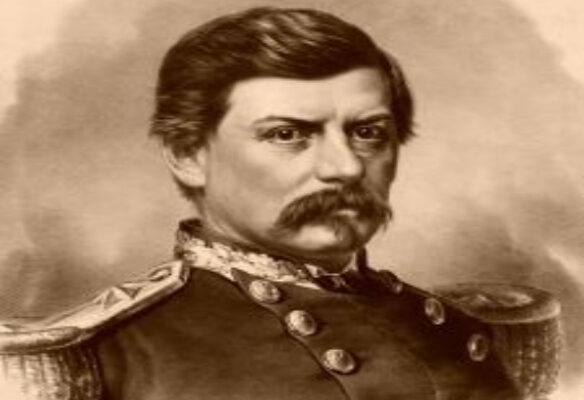
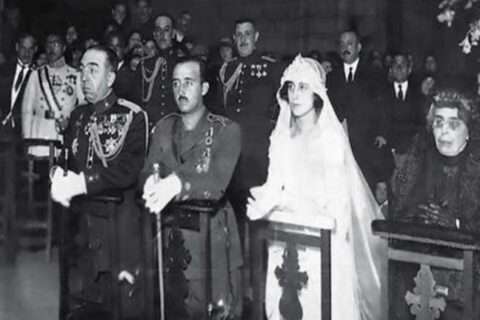
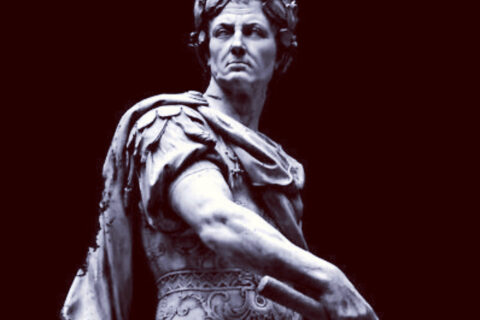
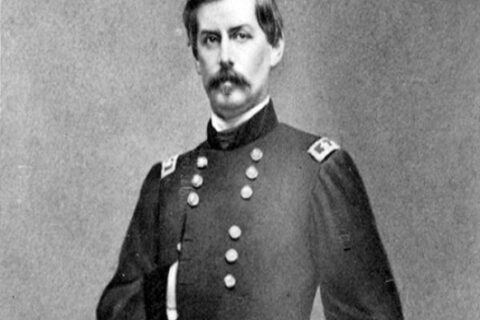
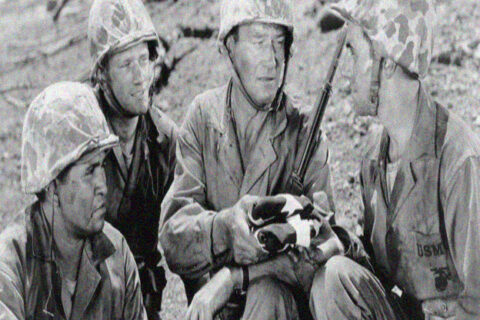
Mr. Smith,
General Lee could have won the favor of European powers if he succeeded up north according to your article, I’ve just studied what was going on out west right before the war between the States, there was a war for resources being fought out here, between the English and French backed Hudson Bay company, the New York financed and chartered American Fur company and John Jacob Astor, the Russian American company, the Northwest company, the Missouri company. It’s obvious whom the Russian-American company backed, evidenced by their war ships protecting Yankee harbors and bays.
I’m just curious, Jefferson Davis chose Judah P
Benjiman for his cabinet, I’m just wondering if there was a French connection going on there, my Confederate French Uncle came out west from Mississipi. Was there a judeo-catholic Louisiana power up against the judeo-puritan N.Y. N.E power? Some kind of turf war between the two? I am asking anyone reading this. I have just read that Zachary Taylor’s Grandson and Jefferson Davis’s nephew was a high ranking RCMP named Zac Wood, according to this book
‘Royal Canadian Mounted Police’ by Richard L. Neuberger 1953.
Are there any dots to connect there? In all of that?
You know Mr. Smith, the pinkertons were a mafia of wall street at the least, Mac’s friend was Alan Pinkerton? The pinkertons gatling gunned around 1200 italians in Colorado in the Ludlow massacre, for not digging lead out of the mine for wall street. I believe Guggenheim in particular, I know a Dow, of Dow-Jones fame was in on it. Also, they were strike breakers all across the US. They were not about to let a White-Power take root out west it seems. Once you wrote Mac was Alan Pinkertons friend I came back to reality. If he had any Character at all, he would have done an about face and ran that criminal scum out from up North!
That I am sure about. I’m just thinking out loud about some sort of French-english connection in all of this.
I wish I could help you, but this is not a subject I am knowledgeable of.